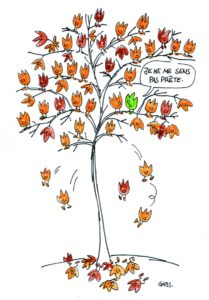Coucou les French learners,
C’est déjà le mois d’octobre ! It is already October! Le temps passe vite ! time goes fast!
I am not ready.
Une chanson sur l’automne
There is this song by popular French singer Francis Cabrel (I just found out he was born in Agen!) entitled Octobre which is simply beautiful:
You can listen to it and fill in the gaps on this interactive page. This exercise is actually about noticing the simple future in French by filling in all the verbs. Although this particular activity will make you read the song and get more input, it is worth wondering if noticing in second language acquisition actually helpful?
“The claim that second language learners must consciously notice the grammatical form of their input in order to acquire grammar” is called the Noticing Hypothesis.
John Truscott at the National Tsing Hua University writes: ” I argue, first, that the foundations of the hypothesis in cognitive psychology are weak; research in this area does not support it, or even provide a clear interpretation for it. The problem of interpreting the hypothesis is much more acute in the area of language acquisition… The various problems can be eliminated or greatly reduced if the Noticing Hypothesis is reformulated as a claim that noticing is necessary for the acquisition of meta-linguistic knowledge but not competence.”
In other words, if you are looking to master grammar rules, noticing and learning the rules consciously is helpful. However, if you want to become competent in another language, it is not efficient to just notice grammar structures. It is much more efficient to listen and to read and to let your brain do the work subconsciously.
I experienced it myself when I acquired Spanish. At first, I was only listening and trying to understand the people around me. It is much later when I could understand 90% of spoken Spanish, that I started to notice grammar structures and that I felt the need to notice them. First all you need is a massive dose of rich comprehensible input.
#inputaloneissufficient
#trusttheprocess
Crier au loup
Do you know this expression “to cry wolf”? It directly comes from Aesop’s fable ” Le garçon qui criait au loup ” which is my new season 4 story.
There are many French expressions with le loup, the wolf certainly because there were many wolves in the past in France. They are now back, even in la Bretagne where they had disappeared for a century! Read this article published in the newspaper Ouest France.
You can also say: à trop crier au loup, on en voit le museau, when you shout wolf too much, you see its muzzle or à trop crier au loup, on finit par ne plus y croire, when you shout wolf too much, we end up not believing it anymore.
Did you already know this story in your own language? Let me know in the comments below.
I love hearing from you so keep up sending me feedback. I am here to help you acquire French effortlessly.
Happy French acquisition!
P.S. Got friends, family, colleagues or clients who want to become fluent in French? Share this with them, they’ll thank you for it

